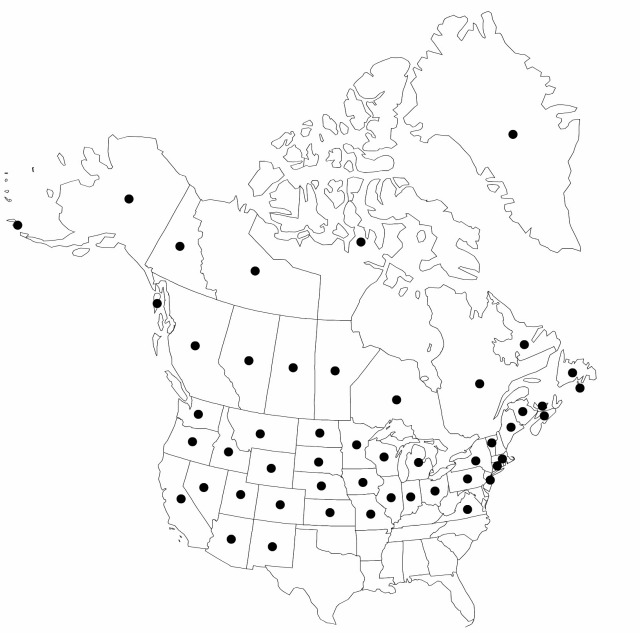Carex aquatilis
Kongl. Vetensk. Acad. Nya Handl. 24: 165. 1803.
Plants not cespitose. Culms 20–150 cm. Leaves: basal sheaths red-brown or brown; sheaths of proximal leaves glabrous, fronts with indistinct spots, veinless, apex U-shaped; blades usually amphi-stomic, papillose on both surfaces. Inflorescences: proximal bract longer than inflorescence. Spikes: erect; proximal 2–6 spikes pistillate; terminal (1–)2–4 spikes staminate. Pistillate scales red-brown to purple-brown, apex obtuse or acute, awnless. Perigynia ascending, veinless, somewhat flattened, loosely enclosing achenes, ellipsoid or obovoid, dull, apex obtuse or acute, papillose. Achenes not constricted, glossy. 2n = 72–80.
Distribution

Alta., B.C., Man., N.B., N.S., N.W.T., Nunavut, Ont., P.E.I., Que., Sask., Yukon, Alaska, Ariz., Calif., Colo., Conn., Idaho, Ill., Ind., Iowa, Kans., Maine, Mass., Mich., Minn., Mo., Mont., N.Dak., N.J., N.Mex., N.Y., Nebr., Nev., Ohio, Oreg., Pa., S.Dak., Utah, Va., Vt., Wash., Wis., Wyo., Europe.
Discussion
Varieties 4 (4 in the flora).
Carex aquatilis is circumboreal and variable; four extensively intergrading varieties are recognized in North America. The species is distinguished by amphistomic (epistomic in var. dives) papillose leaves, glabrous sheaths with a concave apex, perigynia that lack veins and are usually brown-spotted on the proximal half, and have glossy achenes.
Selected References
None.
Lower Taxa
Key
| 1 | Spikes pendent or the terminal erect; proximal peduncle to 11 cm; perigynia ellipsoid; beak purple-brown, 0.3–0.4 mm; culms scabrous on angles. | Carex aquatilis var. dives |
| 1 | Spikes erect; proximal peduncle not more than 4 cm; perigynia usually obovoid; beak pale or purple-brown, not more than 0.2 mm; culms glabrous or scabrous on angles. | > 2 |
| 2 | Pistillate scales pale brown with narrow red-brown margins and broad pale midvein. | Carex aquatilis var. substricta |
| 2 | Pistillate scales red- or purple-brown and narrow pale midvein. | > 3 |
| 3 | Perigynia pale brown; staminate spikes usually 2–4. | Carex aquatilis var. aquatilis |
| 3 | Perigynia purple-brown on apical 1/2; staminate spikes usually 1–2. | Carex aquatilis var. minor |